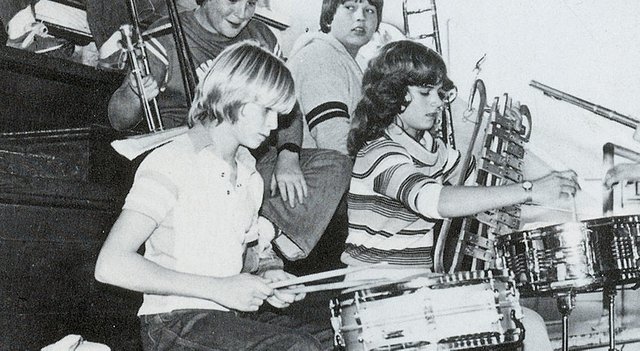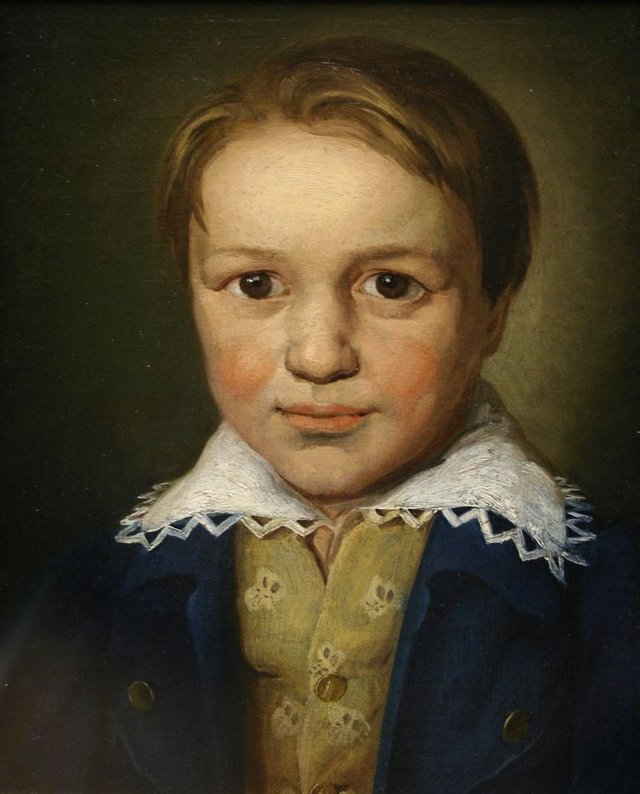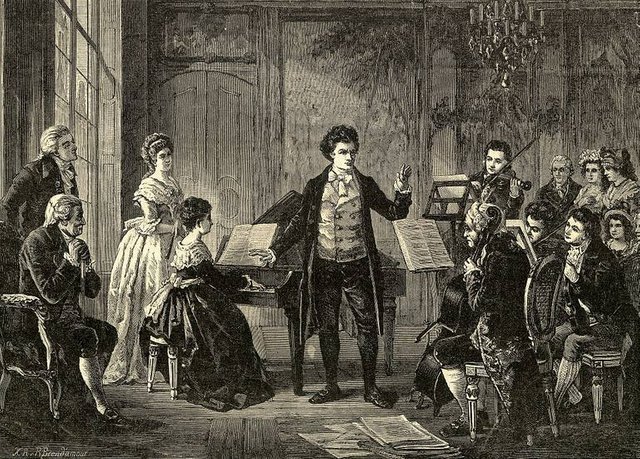ADSactly Culture - The Life of Tortured Artists #3 (Kurt Cobain & Ludwig van Beethoven)

Hello, dear @adsactly readers. Today we are continuing our series on the (often tragic) life of tortured artists. In our two previous installments, we touched upon the lives of Vincent Van Gogh, Ernest Hemingway and Sylvia Plath. And in this next part of our series, we will take a look at the lives of two famously troubled musical geniuses, Kurt Cobain and Ludwig Van Beethoven.
4. Kurt Cobain
Many have said that when they think of the term’ ‘tortured artist’, they think of Slyvia Plath. And while I can see why, I don’t. I think of Kurt Cobain, who’s been a fascination of mine for many years.
Something that’s always seemed very curious to me (and saddening, to be honest) is the fact that Kurt is described by his family and friends as being a happy child for the first nine or so years of his life. He came from an artistically-inclined family (many of his relatives sang or played some instruments, while his grandmother, Iris Cobain was a professional artist) and showed promise and a lot of potential from an early age. He was always drawing, a passion he carried throughout his life, and started learning the piano at age 4.
Described as an enthusiastic, loving child, Cobain’s attitude changed after his parents divorced when he was nine. He later said that he was desperate to have a traditional family, with a mother and a father, and despised his parents for taking that away from him. It didn’t help that his father remarried a woman who already had two children and when they had a boy together, Kurt’s world was shaken, depriving him of the maternal love and attention he so craved and continued to search for throughout his life.
Kurt’s mother, Wendy, also began a new relationship with a man who was abusive to her – abuse young Kurt often witnessed. After a while, Cobain’s mother granted Kurt’s full custody to his dad, who soon became “overwhelmed” by the young rebellious teen and relied on friends and family to take care of the boy.
Kurt moved in with his mother again, for a while. But after dropping out from high school, his mother asked him to either get a job or leave, even going to such lengths as to pack his belongings, which was the start of a period of homelessness for the young Kurt.

A very young Kurt playing drums in high school src
Through these troubled youth, he nurtured his passion for music and became really interested in the punk rock subculture, hanging out at show venues and rehearsal spaces (where he met future Nirvana member Krist Novoselic). He was already writing his own, cryptic music and playing and he became really interested in starting a band, which he eventually did with Novoselic.
Kurt seems to have felt alienated from society throughout his life, often explaining that he didn’t really like people. He often suffered from poverty, as a young struggling artist, and it can be said most of his romantic relationships were dysfunctional (he would later write about them).
People tend to say things like ‘yes, it’s easy to see why he killed himself, if you listen to his lyrics’, and while I do think they pose several questions and reveal a very dark side of his mind, I don’t know if his lyrics should be interpreted literally. But they definitely showed an individual who could delve into the worst parts of humanity.
It seems redundant to point out, but Kurt saw tremendous success with his grunge band Nirvana. Their songs, especially the early ones, were filled with anger and rage at society, you know, a rebellion towards what came before, and yet so much more. Their song ‘Smells Like Teen Spirit’ was (and still is) regarded as an anthem for youth and rebellion.

Kurt with wife Courtney Love and daughter, Frances Bean src
In 1990, Kurt met Hole frontwoman Courtney Love, whom he immediately liked. It was to be the beginning of a very tumultuous relationship (Love often being blamed later on for Cobain’s suicide, even being accused of murder by some). They indulged in heavy drug usage together, married and had a daughter. It’s interesting to note that Love seems to have somehow blamed Kurt for not being as successful as he was. It’s very possible she thought her marriage to him had ruined her career and it’s very possible some of that seeped into their personal life, both parties being abusive to each other on several occasions.
To try and find an explanation for Kurt’s death seems impossible. His untimely demise has sparked so much controversy, so many debates, trials, books, documentaries, it’s a very strange, morbid fascination that people have. Maybe because they wish he wasn’t really dead. His heavy drug use, depression, feeling of alienation and extreme loneliness, the troublesome personal life, the severe stomach pain he battled for years – they’ve all been offered up as possible causes for his suicide. And it’s really hard to tell why and what happened. In Cobain’s own words, he hadn’t
felt the excitement of listening to as well as creating music, along with really writing [...] for too many years now
But the only thing we can honestly claim to know is he tragically took his own life at the painfully-young age of twenty-seven.
5. Ludwig Van Beethoven

13-year-old Beethoven src
Like with the other people in our series, today we enjoy Beethoven’s music and regard it as the height of culture and good taste. But we tend to overlook Beethoven’s troubled life and all the pain and hurt that payed for this great music we now so enjoy.
Ludwig Van Beethoven had a troublesome childhood, dominated by his tyrannical father, who sought to sell off his child as a musical prodigy (which he admittedly was) and presumably, make loads of money off his son’s talent. Beethoven being born only fourteen years after the great Wolfgang Amadeus Mozart, another phenomenally talented composer and prodigy who composed and performed before Austrian royalty before the age of five.
So, it’s easy to understand how, seeing young Mozart’s tremendous success, Beethoven’s father was keen to have young Ludwig follow in his footsteps. However, this created a nightmarish childhood atmosphere for young Beethoven, who was often brought to tears by his father (who was also his first musical teacher), was pressured to compose and practice for many long hours, and was even dragged out of bed frequently by another music teacher, the insomniac Pfeiffer, to play.
His father’s obsession of selling him off as “the next Mozart” would be the beginning of a life-long admiration for the great composer, on Beethoven’s part, whose early work is obviously greatly influenced by Mozart’s own music. The two were even said to have met, the young Beethoven even gaining Mozart’s admiration with an improvised piece, but the truth of this meeting is rather dubious.
In his youth, Beethoven was a prolific composer, gaining great popularity and the nobility’s admiration. He composed numerous fascinating pieces, the beautiful Pathetique Sonata being just one of many. He also taught music, in his youth, notably to the daughters of Hungarian Countess Anna Brunsvik, falling in love with the younger, Josephine, an infatuation that is said to have continued for a long part of his life.
However, it was an uneasy relationship, due to the considerable class difference, an issue that would mark many of Beethoven’s love affairs.
Hearing loss
There’s something horribly poetic in Beethoven’s story. For a composer, a man who lived through and for his music, to lose the ability to hear it is tragic beyond words, I feel.
Beethoven’s loss of hearing is believed to have started in 1798, when the composer was only 28 years old, after a fit of rage at being interrupted while playing. Beethoven claimed he fell down and then, when he got up again, he was deaf. Although this would be a back and forth issue, Beethoven never fully regained his hearing. It was better for a while, but only to get worse in the end, rendering the composer almost completely deaf by his early forties. He started having trouble communicating (several of his conversations book in which friends wrote down things they wanted to tell him, still exist today) and most importantly, hearing his own compositions, which depressed him greatly, prompting him to even attempt suicide.
Interestingly, he kept composing music, despite his loss of hearing and several of his most popular works (thought by many to be his best work) come from this later period in his life. How interesting to think that some of our most beloved music was written by a deaf man.
There is such vibrancy in his later music, such obvious proof of his musical genius. Come to think of it, one of the saddest things I’ve ever heard is that, at a concert later in his life, Beethoven had to be turned around to see the audience applauding, because he couldn’t hear them and otherwise he wouldn’t know how much they liked his music. How sad is that?
Beethoven’s loss of hearing is one of the great mysteries of history. It’s unclear what prompted this, although people have come up with various explanations over time, from typhus to blaming it on his habit of submerging his head in cold water to keep awake. Whatever the cause, it was understandably a source of great torment for the composer. Although he kept composing, it became increasingly difficult to actually play concerts.
Beethoven died on the 26th of March 1827, the first in our series not to take his own life. The cause of his death is yet unknown, but there are several possibilities from cirrhosis (he consumed alcohol heavily throughout his life) to syphilis to lead poisoning (which may have been prescribed by his doctor and caused an accidental poisoning).
He remains one of the most fascinating, complex artists the world has ever known.
And thus concludes our third installment in this series on the lives of troubled artists. I do hope you’ve enjoyed reading these and I look forward to hearing from you.
Again, if you know any troubled artists with fascinating stories, but not mentioned here, do tell us about them in the comments!
Authored by @honeydue
Most references - Wikipedia 1 2
Click on the coin to join our Discord Chat

Witness proposal is here:
Go To Steem Witness Page
In the bottom of the page type: adsactly-witness and press vote.

Use small letters and no "@" sign. Or, click here to vote directly!
Thank you!



Kurt kobain, Although I'm not a big fan but I respect him. Beethoven, Well one of the best composers in the world. Even though he lost his hearing he was still in his power. Excellent writing!
La musica es totalmente esperitual y va mas alla del estado fisico. Es magia puro asi lo defino..aunque es un tema profundo hablar de la musica . Nada mas con el tema de Beethoven. Es un ejemplo.. otro caso es un musico (bass) jaco pastorius. Una historia un poco controversial para ilustre bajista . Saludos aamigos
@honeydue, Sometimes life reflects as so Injustice and these kind of stories are example of it. And it's not the fault of children, if their roots get shaked at very young age then their mind cannot rain with posivity and positive perception towards world. Our environment mould us.
Very true. Kurt has had a real shitty childhood; one he could not recover from.
From what we go through it will stay with us forever because we've lived it and aspects which we live stay in the form of Immovable.
I was a big fan of Kurt when I was growing up. I saw a video of him and Courtney off their heads today and it was really sad to see. It's important to highlight the struggles artists can have when being creative, it doesn't have to be a painful experience.
Posted using Partiko Android
Please follow @weebro. I am already following you.
Posted using Partiko Messaging
Reflective post.
The story of the artists are very heartbreaking. we know how the greatness of these two musical characters. their works are very monumental. We know how Kurt Cobain is engaged in music and being a figure of grunge with his high intelligence makes his works so catching on in the hearts of his fans. Unfortunately, in his popularity he was depressed because of the pressure he had to bear. The worship of the audience led him to become a stranger in the crowd. so it is not surprising that his biological life became worse and even died by suicide. An absurd way to find the end of life. Absurdity that should not be done is only due to world problems. Because even without suicide we will all die. then from him we can take lessons so that we continue to work and don't think of ending life in the wrong way. Likewise Beethoven, a figure who has a very large influence in the world of classical music. he was able to produce great works and no doubt about his credibility in the world of music. However, once again it was unfortunate that his personal life was not as bright as his career. Her physical and mental suffering increasingly when her hearing decreases and eventually is deaf. Likewise, love that is always unrequited makes it feel alive without any use. But there is a lesson that we can learn, that is a continuous spirit of work that we should take as an example.
Thank you @honeydue
Thank you @adsactly
Thank you Steemit
Warm regard from Indonesia
I appreciate your work on these two music figures, @honeydue. Although I had read about the life and death of the singer Kurt Covain, you do a pretty complete account.
Now, I'm more interested in Beethoven, of greater transcendence as a musician, undoubtedly. I don't remember who I heard or read an interpretation of the possible meaning of the famous leitmotiv of his most widespread symphony, No. 5 (the "fifth", he is told), which associated it with death's knocking on the door. With this reference I want to allude to the conscience possibly tormented by the threat of death that accompanied it. We find such a sensation in his master, Mozart, a musician also tormented in his own way. In the excellent film Amadeus that Milos Forman makes about Mozart's life, there is a moment in which a similar torment for death is suggested, when a ghostly presence knocks on his door, presaging the death of his father, which will give rise to his famous Requiem.
Thank you for your post, @honeydue. Greetings.
There is no doubt that when we talk about artists with stormy lives, Kurt Cobain must be on the list. When we read about his childhood and adolescence, before he was 18 he had already attempted suicide twice, we are not surprised by his fateful ending. Personally, I believe that in many of these artists the relationship they have with their family, their immediate environment, works as a trigger for tragedy and fatality. It is striking the marks, the numerous signs of help that are left through their work and that sometimes are not perceived by others. Remember that depression does not affect people according to what they have or what they lack. Nor is it a disease that comes to us like the flu. Its causes and consequences are as innumerable as they are fatal. In music, another contemporary artist who had a difficult life full of excesses with a tragic ending was Amy Winehouse. I'm enjoying this series, @honeydue. Thanks for sharing.
Hi, @adsactly!
You just got a 0.41% upvote from SteemPlus!
To get higher upvotes, earn more SteemPlus Points (SPP). On your Steemit wallet, check your SPP balance and click on "How to earn SPP?" to find out all the ways to earn.
If you're not using SteemPlus yet, please check our last posts in here to see the many ways in which SteemPlus can improve your Steem experience on Steemit and Busy.